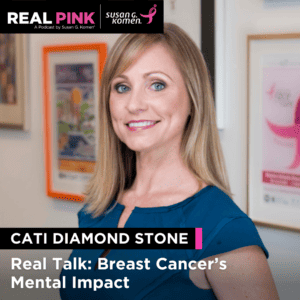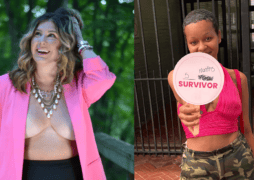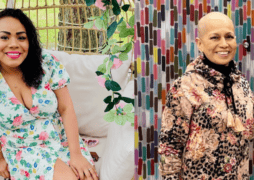Real Talk is a new content series led by Susan G. Komen where guests are talking about all sides of breast cancer. From diagnosis to treatment to survivorship to living with metastatic breast cancer and all the challenges in between.
Cati Diamond Stone shares her mental and emotional struggles as she battled stage 3 breast cancer at the age of 35, and how she continues to manager her health needs. Stone, a 12-year survivor, leads Komen’s community health work, including the Patient Care Center.
In her own words, Stone opens up about how breast cancer impacted her own mental health in the hopes of encouraging others to feel comfortable talking about mental health and seeking help when needed.
Breast cancer is hard. Everyone who has been diagnosed goes through their own unique journey, but you can count on one thing – you will be tested emotionally. It is common for people diagnosed with breast cancer to experience depression, anxiety, fear, and mental and emotional distress. In the 12 years since my breast cancer diagnosis, I have been one of those people.
As a culture, we don’t talk enough about mental health. I know many people who have kept quiet about their mental health challenges due to fear of stigma, but the impacts of the COVID – 19 pandemic seem to have paved the way for a collective acknowledgement that everyone experiences mental health challenges during their lifetimes and that there is a need to ensure everyone has access to mental health support resources.
I can’t help but draw parallels between how we talk (or not) about mental health to how far we have come in the way we talk about breast cancer. When Susan G. Komen was founded in 1982, it was taboo to talk about breast cancer. It was unheard of to say the word breast in public, let alone talk about breast cancer, which led so many people to suffer in silence. We have come a long way since then, and the discourse about breast cancer has been normalized and even emphasized in a way that has resulted in increased awareness and advancements in detection and treatment that have saved millions of lives.
We need to do the same thing with emotional and mental health. Life can sometimes be hard. A breast cancer diagnosis is hard. Treatment is hard. Living with metastatic breast cancer is hard. Even survivorship can be hard, and we need to ensure that everyone feels safe talking about all of the challenges that are presented as a result of breast cancer, not just the physical ones, without any fear of embarrassment or reprisal.
I am personally not someone who leads with my feelings. But after my own breast cancer diagnosis, I found myself being unable to juggle all the decisions that had to be made to understand my treatment and how to balance it with the need to be there for my 16-month-old daughter and maintain my career. It was taking a toll on my typically sunny disposition, and I needed help. I found comfort in talking to a counselor associated with the health system where I was being treated. For me, talking to someone with whom I didn’t have a personal relationship was helpful because I needed an objective support system in addition to the support I was receiving from my family and friends. I’ve since talked with many others who leaned on their families, friends, faith communities and/or support groups to get them through. We are all unique, and the good news is that there is support available for everyone’s individualized needs.
I’ve also heard from many caregivers who had their own struggles dealing with the mental and emotional impacts of providing care and support for someone going through a breast cancer journey. Caregivers can often be forgotten, and it is important that their needs are also acknowledged and addressed.
A great step for anyone in need of emotional support is to reach out to the Komen Breast Care Helpline. The Helpline is staffed by caring and compassionate oncology social workers and highly trained specialists who can help with the emotional challenges of dealing with a breast cancer diagnosis or supporting someone who is going through a breast cancer journey. The Helpline team can also help guide you to resources such as financial assistance and patient navigation. The Helpline can be reached at 1-877-GO-KOMEN or helpline@komen.org.
YOU are special, and the world needs you, so please take care of your whole self, including your mental health.




